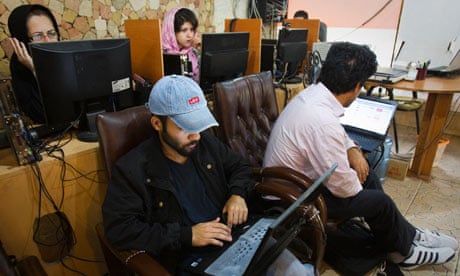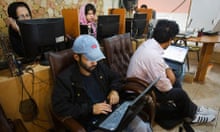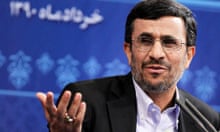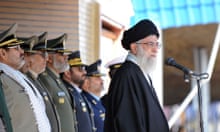Iran is clamping down heavily on web users before parliamentary elections in March with draconian rules on cybercafes and preparations to launch a national internet.
Tests for a countrywide network aimed at substituting services run through the world wide web have been carried out by Iran's ministry of information and communication technology, according to a newspaper report. The move has prompted fears among its online community that Iran intends to withdraw from the global internet.
The police this week imposed tighter regulations on internet cafes. Cafe owners have been given a two-week ultimatum to adopt rules requiring them to check the identity cards of their customers before providing services.
"Internet cafes are required to write down the forename, surname, name of the father, national identification number, postcode and telephone number of each customer," said an Iranian police statement, according to the news website Tabnak.
"Besides the personal information, they must maintain other information of the customer such as the date and the time of using the internet and the IP address, and the addresses of the websites visited. They should keep these informations for each individuals for at least six months."
In recent weeks, users in Iran have complained of a significant reduction in internet speed, reported the reformist newspaper, Roozegar, which has recently resumed publication after months of closure. The newspaper said it appeared to be the result of testing the national internet.
"According to some of the people in charge of the communication industry, attempts to launch a national internet network are the cause of disruption in internet and its speed reduction in recent weeks," Roozegar reported.
Some government websites, however, cited other reasons for the drop in speed.
"If the national internet comes into effect, the internet in the country will act like an internal network and therefore visiting the websites needs permission from the people in charge. Users outside Iran also need permission to visit websites running from inside the country," Roozegar's report said.
Speaking to the Guardian on condition of anonymity, an Iranian IT expert with close knowledge of the national internet project, which he described as a corporate-style intranet, said: "Despite what others think, intranet is not primarily aimed at curbing the global internet but Iran is creating it to secure its own military, banking and sensitive data from the outside world.
"Iran has fears of an outside cyber-attack like that of the Stuxnet, and is trying to protect its sensitive data from being accessible on the world wide web."
Stuxnet, a computer worm designed to sabotage Iran's uranium enrichment project, hit the country's nuclear facilities in 2010. Iranian authorities initially played down the impact of the Stuxnet but eventually admitted the nuclear programme had been damaged by the malware.
"At the same time, Iran is working on software robots to analyse exchanging emails and chats, attempting to find more effective ways of controlling user's online activities," said the expert.
A blogger in Tehran said recent news was of significant concern to the country's online community. "I'm addicted to the internet and can't imagine a day without the global internet," said the blogger. "But Iranians have always found ways to bypass the regime's censorship, for example by using illegal satellite dishes to watch banned television channels, and I'm sure in the 21st century we should be able to find alternatives should they opt to pull out of the world wide web."
The authorities have said for some years that Iran should have a parallel network which would conform to Islamic values and provide "appropriate" services. In April, a senior official, Ali Agha-Mohammadi announced government plans to launch "halal internet".
For Iranian officials, the need for such a network became more evident after the disputed presidential elections in 2009, when many protesters used social networks.
Less than two months before the parliamentary elections,- Iran's first national election since 2009, the regime warned against any online efforts to organise a boycott of the vote and said they would be considered a crime. Iran's bloggers have been prohibited from publishing any satirical materials about the elections or encouraging others to participate in a boycott.
In June, the US was reported to be funding plans to facilitate internet access and mobile phone communications in countries with tight controls on freedom of speech, such as Iran, through a project called "shadow internet" or "internet in a suitcase". Iran responded to the move by stepping up its online censorship by upgrading its filtering system.
Iran is suspected to have sought the support of China for its online censorship campaign but Huawei, a leading Chinese telecoms company, which has been accused of supplying Iran with equipment to enable censorship, denied any wrongdoing. More than 5m websites are filtered in Iran, but many Iranians access blocked addresses with help from proxy websites or virtual private network services. An Iranian official said last year that more than 17 million Iranians have Facebook accounts, although the site remains blocked in Iran.








